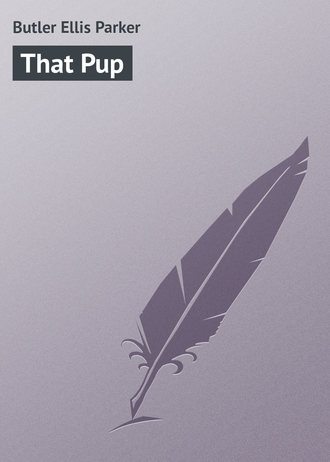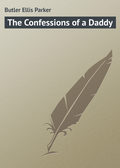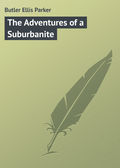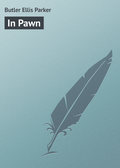
Butler Ellis Parker
That Pup
So he went over and got his shotgun, just to give Fluff his first lesson. The first thing a duck dog must learn is not to be afraid of a gun, and Brownlee said that if a dog first learned about guns right at his home he was not so apt to be afraid of them. He said that if a dog heard a gun for the first time when he was away from home and in strange surroundings he was quite right to be surprised and startled, but if he heard it in the bosom of his family, with all his friends calmly seated about, he would think it was a natural thing, and accept it as such.
So Brownlee put a shell in his gun and Mas-sett and Murchison sat on the porch steps and pretended to be uninterested and normal, and Brownlee stood up and aimed the gun in the air. Fluff was eating a bone, but Brownlee spoke to him and he looked up, and Brownlee pulled the trigger. It seemed about five minutes before Fluff struck the ground, he jumped so high when the gun was fired, and then he started north by northeast at about sixty miles an hour. He came back all right, three weeks later, but his tail was still between his legs.
Brownlee didn’t feel the least discouraged. He said he saw now that the whole principle of what he had done was wrong; that no dog with any brains whatever could be anything but frightened to hear a gun shot off right in the bosom of his family. That was no place to fire a gun. He said Fluff evidently thought the whole lot of us were crazy, and ran in fear of his life, thinking we were insane and might shoot him next. He said the thing to do was to take the shotgun into its natural surroundings and let Fluff learn to love it there. He pictured Fluff enjoying the sound of the gun when he heard it at the edge of the lake.
Murchison never hunted ducks, but as Fluff was his dog, he went with Brownlee, and of course Massett went. Massett wanted to see the failure. He said he wished stags were as plentiful as ducks, and he would show Brownlee!
Fluff was a strong dog – he seemed to have a strain of ox in him, so far as strength went – and as long as he saw the gun he insisted that he would stay at home; but when Brownlee wrapped the gun in brown paper so it looked like a big parcel from the meat shop, the horse that they had hitched to the buck-board was able to drag Fluff along without straining itself. Fluff was fastened to the rear axle with a chain.
When they reached Duck Lake, Brownlee untied Fluff and patted him, and then unwrapped the gun. Fluff gave one pained glance and made the six-mile run home in seven minutes without stopping. He was home before Brownlee could think of anything to say, and he went so far into his kennel that Murchison had to take off the boards at the back to find him that night.
“That’s nothing,” was what Brownlee said when he did speak; “young dogs are often that way. Gun fright. They have to be gun broken. You come out to-morrow, and I’ll show you how a man who really knows how to handle a dog does the trick.”
The next day, when Fluff saw the buck-board he went into his kennel, and they couldn’t pry him out with the hoe-handle. He connected buckboards and guns in his mind, so Brownlee borrowed the butcher’s delivery wagon, and they drove to Wild Lake. It was seven miles, but Fluff seemed more willing to go in that direction than toward Duck Lake. He did not seem to care to go to Duck Lake at all.
“Now, then,” said Brownlee, “I’ll show you the intelligent way to handle a dog. I’ll prove to him that he has nothing to fear, that I am his comrade and friend. And at the same time,” he said, “I’ll not have him running off home and spoiling our day’s sport.”
So he took the chain and fastened it around his waist, and then he sat down and talked to Fluff like an old friend, and got him in a playful mood. Then he had Murchison get the gun out of the wagon and lay it on the ground about twenty feet off. It was wrapped in brown paper.
Brownlee talked to Fluff and told him what fine sport duck hunting is, and then, as if by chance, he got on his hands and knees and crawled toward the gun. Fluff hung back a little, but the chain just coaxed him a little, too, and they edged up to the gun, and Brownlee pretended to discover it unexpectedly.
“Well, well!” he said. “What’s this?”
Fluff nosed up to it and sniffed it, and then went at it as if it was Massett’s cat. That Brownlee had wrapped a beefsteak around the gun, inside the paper, and Fluff tore off the paper and ate the steak, and Brownlee winked at Murchison.
“I declare,” he said, “if here isn’t a gun! Look at this, Fluff – a gun! Gosh! but we are in luck!”
Would you believe it, that dog sniffed at the gun, and did not fear it in the least? You could have hit him on the head with it and he would not have minded it. He never did mind being hit with small things like guns and ax handles.
Brownlee got up and stood erect.
“You see!” he said proudly. “All a man needs with a dog like this is intelligence. A dog is like a horse. He wants his reason appealed to. Now, if I fire the gun, he may be a little startled, but I have created a faith in me in him. He knows there is nothing dangerous in a gun as a gun. He knows I am not afraid of it, so he is not afraid. He realizes that we are chained together, and that proves to him that he need not run unless I run. Now watch.”
Brownlee fired the shotgun.
Instantly he started for home. He did not start lazily, like a boy starting to the wood pile, but went promptly and with a dash. His first jump was only ten feet, and we heard him grunt as he landed, but after that he got into his stride and made fourteen feet each jump. He was bent forward a good deal in the middle, where the chain was, and in many ways he was not as graceful as a professional cinder-path track runner, but, in running, the main thing is to cover the ground rapidly. Brownlee did that.
Massett said it was a bad start. He said it was all right to start a hundred-yard dash that way, but for a long-distance run – a run of seven miles across country – the start was too impetuous; that it showed a lack of generalship, and that when it came to the finish the affair would be tame; but it wasn’t.
Brownlee said afterwards that there wasn’t a tame moment in the entire seven miles. It was rather more wild than tame. He felt right from the start that the finish would be sensational, unless the chain cut him quite in two, and it didn’t. He said that when the chain had cut as far as his spinal column it could go no farther, and it stopped and clung there, but it was the only thing that did stop, except his breath. It was several years later that I first met Brownlee, and he was still breathing hard, like a man who has just been running rapidly. Brownlee says when he shuts his eyes his legs still seem to be going.
The first mile was through underbrush, and that was lucky, for the underbrush removed most of Brownlee’s clothing, and put him in better running weight, but at the mile and a quarter they struck the road. He said at two miles he thought he might be overexercising the dog and maybe he had better stop, but the dog seemed anxious to get home so he didn’t stop there. He said that at three miles he was sure the dog was overdoing, and that with his knowledge of dogs he was perfectly able to stop a running dog in its own length if he could speak to it, but he couldn’t speak to this dog for two reasons. One was that he couldn’t overtake the dog and the other was that all the speak was yanked out of him.
When they reached five miles the dog seemed to think they were taking too much time to get home, and let out a few more laps of speed, and it was right there that Brownlee decided that Fluff had some greyhound blood in him.
He said that when they reached town he felt as if he would have been glad to stop at his own house and lie down for awhile, but the dog didn’t want to, and so they went on; but that he ought to be thankful that the dog was willing to stop at that town at all. The next town was twelve miles farther on, and the roads were bad. But the dog turned into Murchison’s yard and went right into his kennel.
When Murchison and Massett got home, an hour or so later, after driving the horse all the way at a gallop, they found old Gregg, the carpenter, prying the roof off the kennel. You see, Murchison had knocked the rear out of the kennel the day before, and so when the dog aimed for the front he went straight through, and as Brownlee was built more perpendicular than the dog, Brownlee didn’t go quite through. He went in something like doubling up a dollar bill to put it into a thimble. I don’t suppose anyone would want to double up a dollar bill to put it into a thimble, but neither did Brownlee want to be doubled up and put into the kennel. It was the dog’s thought. So they had to take the kennel roof off.
When they got Brownlee out they laid him on the grass, and covered him up with a porch rug, and let him lie there a couple of hours to pant, for that seemed what he wanted to do just then. It was the longest period Brownlee ever spent awake without talking about dog.
Murchison and Massett and old Gregg and twenty-six informal guests stood around and gazed at Brownlee panting. Presently Brownlee was able to gasp out a few words.
“Murchison,” he gasped, “Murchison, if you just had that dog in Florence – or wherever it is they race dogs – you’d have a fortune.”
He panted awhile, and then gasped out:
“He’s a great runner; a phenomenal runner!”
He had to pant more, and then he gasped with pride:
“But I wasn’t three feet behind him all the way!”







